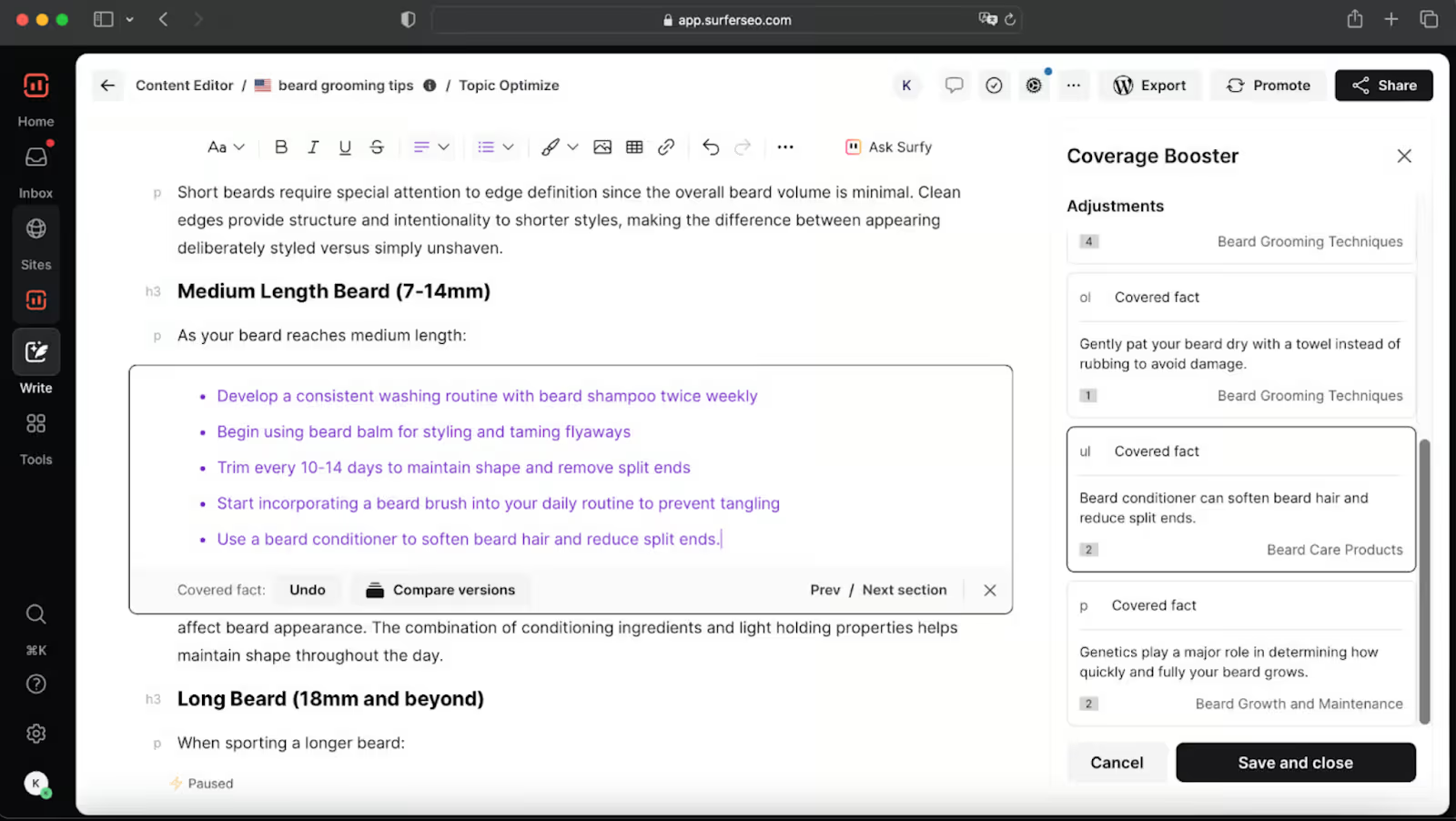For years, SEOs have repeated the same advice:
“Write longer content.”
“Google prefers in-depth pages.”
“Aim for 2,000+ words.”
But when I looked at the data, the truth became impossible to ignore:
Content length doesn’t matter for SEO in 2025.
Here’s what I found after digging into 1 million pages, and how it reshapes how we think about content quality.
The hidden signals behind content performance
Surfer’s Content Score is built on dozens of on-page signals, from structure and keyword placement to the number of recommended terms used.
It’s designed to reflect what’s working right now in search, and I’m always looking for ways to make it smarter.
In this experiment, I started by looking at the factors that make up Surfer’s Content Score, including:
- Text length
- Number of headings or paragraphs
- Keyword presence in H1 or image alt text
- Usage of recommended terms
Each factor contributes to the total Content Score, but some carry more weight than others.
The question is, are we weighing these factors the right way?
Analyzing 1 million pages
I pulled data from 10,000 real SERPs, analyzing 100 top-ranking pages from each, so 1 million pages in total.
Then I:
- Filtered out junk (super short or spammy pages)
- Calculated a Content Score for every page using the current weights
- Measured how well the score correlated with actual Google rankings (0.245)
To do that, I used Spearman correlation—a statistical method that measures how well the rank order of two variables aligns. In this case: does a higher Content Score generally mean a better Google position?
The correlation value ranges from –1 to 1:
- 1 means perfect positive correlation
- 0 means no correlation
- –1 means perfect negative correlation
Then came the fun part: I rebuilt the scoring system to make it smarter.
Rebuilding Surfer's score to reflect what ranks
Instead of manually guessing which weights might be better, I built a differentiable correlation algorithm—basically a system that adjusts the factor weights step by step, trying to improve correlation with rankings.
Its goal? Maximize how accurately the Content Score reflects what ranks.
The results:
- Text-length factors dropped to zero
- Term usage surged in importance
- Score-to-ranking correlation improved to 0.284
A 0.28 correlation might not seem dramatic at first glance, but in large-scale ranking prediction, it’s a strong signal.
For context, an Ahrefs study found that backlinks, one of the most well-known ranking factors, show an average correlation of just 0.17.
This correlation increase wasn’t a tweak. It was a fundamental shift.
🔎 Soon, I’ll share a deeper dive into how this revamped scoring model translates into actual ranking improvements
Priortize content coverage over word count
However, I still wondered why the length of the text itself, in isolation from CS, maintains a high correlation.
At first, it seemed like term usage and text length might still be linked—longer pages naturally include more terms. So I dug deeper.
When I filtered the data to include only pages that used at least 50% of suggested terms, something surprising happened:
Text length stopped mattering entirely. In fact, there was a slight preference for shorter, more focused content.
The patterns held even across tighter ranges of term coverage (10–15%, 15–20%, etc.).
Google's algorithms read for meaning, not size
Why does this shift matter?
Based on my observations on AI research, Google isn’t evaluating content the way it used to. With LLMs parsing pages using enormous context windows—think 1 million+ tokens—it no longer relies on word count as a shortcut for quality.
It evaluates meaning, relevance, and topical completeness.
If your content says everything it needs to in 700 words, that’s enough. If it takes 2,000 words to be useful, go for it. But stop writing more just because you think you have to.
💡 Did you know? Our research also shows that, alongside text length, factors like text structure and the number of images are no longer directly evaluated by search algorithms. They still play an important role for human readers—improving clarity, scannability, and engagement—but machines are far more focused on meaning and topical depth.
What to do instead of chasing word count
If you’re still writing long content just for the sake of it—stop.
- Don’t chase word count
- Don’t fluff your pages
- Don’t assume longer = better
Instead, focus on writing complete, relevant, and helpful content.
Use the right terms. Cover the topic deeply. Be useful.
Google doesn’t reward length anymore. It rewards coverage.
From insight to action: boost topical coverage with Surfer
If coverage—not length—is what really moves the needle, then you need tools built to help you optimize for exactly that.
That’s exactly what Surfer’s Coverage Booster is designed to help with.
It scans top-performing SERPs, AI Overviews, and trusted LLMs like ChatGPT and Perplexity to uncover context-rich facts, subtopics, and relationships your content might be missing.
Then it suggests (and automatically inserts) high-context additions directly into your article, so you can strengthen topical coverage in seconds, without manual research.
Let’s say you’re writing about “beard grooming tips.” Dropping in isolated terms like “beard conditioner” or “split ends” won’t move the needle. But tie them together with context, like “Use a beard conditioner to soften beard hair and reduce split ends”, and suddenly your content becomes more meaningful.

Coverage Booster lives inside the Content Editor and helps ensure your content isn’t just long—it’s complete. And that’s what actually ranks.


.avif)

